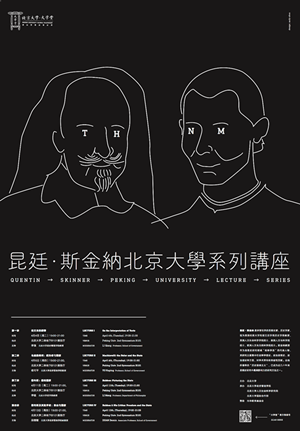Peking University, Apr 5, 2017:At the invitation of Peking University Global Fellowship, Quentin Skinner, a world-famous intellectual historian and professor of Queen Mary University of London, is visiting Peking University from April 2 to April 15 to deliver 4 lectures and to exchange ideas with Chinese scholars of political and intellectual history.
This event is hosted by Peking University, co-organized by PKU School of Government, Institute of Academy of Humanities and Social Science, and Office of International Relations, and funded by Kwang-Hua Education Foundation.
The arrangements are as follows:
1. Serial Lectures:
① On the Interpretations of Texts
Time: April 4 (Tuesday) 19:00-21:00
Location: B101 lecture hall, No. 2Gymnasium of Peking University.
Hosted by Prof. Li Qiang (School of Government, Peking University)
② Machiavelli: the Ruler and the State
Time: April 6 (Thursday) 19:00-21:00
Location: B101 lecture hall, No. 2 Gymnasium of Peking University.
Hosted by Prof. Yu Keping (Peking University, dean of the School of Government)
③ Hobbes: Picturing the State
Time: April 11 (Tuesday) 19:00-21:00
Location: B101 lecture hall, No. 2 Gymnasium of Peking University
Hosted by Prof. Li Meng (School of Philosophy, Peking University)
④ Hobbes and His Critics: Freedom and the State
Time: April 13 (Thursday) 19:00-21:00
Location: The second gymnasium of Peking University, B101 lecture hall.
Hosted by Associate Prof. Duan Demin (School of Government, Peking University)
Language: English.
All lectures above are open to the public. No appointment needed.
2. Academic Dialogue: “Themes and Methods of Modern Political Thought”
By invitation only.
Introduction of the lecturer:
Quentin Skinner is world famous intellectual historian. He was the professor of Political Science at the University of Cambridge from 1979 to 1996, and was Regius Professor of Modern History at the University of Cambridge between 1996 and 2008.He is currently the Barber Beaumont Professor of the Humanities and Co-director of the Centre for the Study of the History of Political Thought at Queen Mary University of London.
Skinner is regarded as one of the founders of the ‘Cambridge School’ of the history of political thought, and has made significant academic accomplishments in the study of Machiavelli, the modern intellectual history in Britain, and the methodology of intellectual history, etc. His 'historical contextualism' has become one of the most important methods in the field of intellectual history. Skinner is a fellow of the British Academy, the American Academy of Arts and Sciences, and the Academia Europaea (the Academy of Europe). He is also awarded by distinguished academic prizes like Wolfson History Prize and Balzan Prize.
The focuses of Skinner’s researches areon hermeneutics, history of political thought and political theory, in which he has made breakthroughs.
In terms ofhermeneutics, Professor Skinnerhascriticizedthe traditional research methods ofthe history of ideas, and introduced the “speech act” theory in linguistics into the study of history, formingacontextual approach.This approachnot only overcame the disadvantages ofthe traditional text-centered approach,but also realized the historicity of the study of intellectual history by sorting out historical contexts and revealing the intentions of thinkers. Thisrenewal ofmethodology is named ‘Skinner’s Revolution.’
As to the history of political thought, Skinner’s specialty is early-modern European political thought, especially that of Renaissance and the Reformation. He has specifically been concerned with the emergence of modern theories about the nature of the state, and with debates about the nature of political liberty. Besides, when studying Machiavelli and Hobbes, hereestablished theirpolitical debates and revealed new aspects of the thinkers’ thoughts.
In the field of political theory, Professor Skinner provoked new thoughts upon the theory of political and civil liberty. He has profoundly inspiredthe revival of Republicism, the rethinking of the connotation of liberty and the understanding of the importance of civil morality.
Principal publications of Professor Skinner:
The Foundations of Modern Political Thought, Cambridge University, 1978
Machiavelli, Oxford University Press, 1981
Reason and Rhetoric in the Philosophy of Hobbes, Cambridge University Press, 1996
Visions of Politics, Cambridge University Press, 2002
Written by: Hu Yue
Edited by: Xu Penghang
